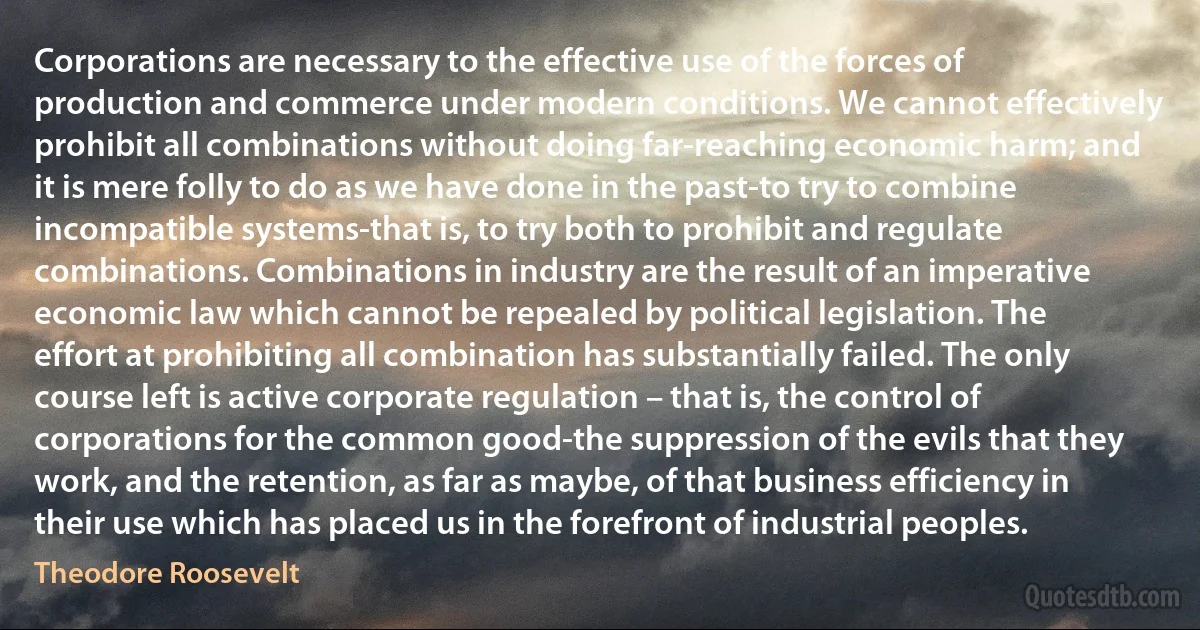
Corporations are necessary to the effective use of the forces of production and commerce under modern conditions. We cannot effectively prohibit all combinations without doing far-reaching economic harm; and it is mere folly to do as we have done in the past-to try to combine incompatible systems-that is, to try both to prohibit and regulate combinations. Combinations in industry are the result of an imperative economic law which cannot be repealed by political legislation. The effort at prohibiting all combination has substantially failed. The only course left is active corporate regulation – that is, the control of corporations for the common good-the suppression of the evils that they work, and the retention, as far as maybe, of that business efficiency in their use which has placed us in the forefront of industrial peoples.
Theodore RooseveltRelated topics
business common control corporate course done effort far folly harm imperative industrial industry law left legislation mere necessary production regulation result suppression try under use work forefront peoplesRelated quotes
We have entered a time of global transition marked by uniquely contradictory trends. Regional and continental associations of States are evolving ways to deepen cooperation and ease some of the contentious characteristics of sovereign and nationalistic rivalries. National boundaries are blurred by advanced communications and global commerce, and by the decisions of States to yield some sovereign prerogatives to larger, common political associations. At the same time, however, fierce new assertions of nationalism and sovereignty spring up, and the cohesion of States is threatened by brutal ethnic, religious, social, cultural or linguistic strife. Social peace is challenged on the one hand by new assertions of discrimination and exclusion and, on the other, by acts of terrorism seeking to undermine evolution and change through democratic means.

Boutros Boutros-Ghali
It was recognized, and recognized fairly, that when you get large bodies of workmen together they cannot, nor is it fair to expect them to, negotiate individually against the more powerful management that controls large bodies of men; and so it was that, to secure effective freedom of contract, power was given for man to join himself to man for that very purpose of bettering his position. The trade union as we know it came into being to meet the new conditions of industry. It was essential then, and for that purpose it will continue to be essential. This country is the birthplace of that kind of combination-this country, which has been the birthplace of every effort to free mankind by legitimate and evolutionary means, and will continue to be so, long after the efforts of other and less happy countries have gone down in failure and disaster.

Stanley Baldwin
The economic betterment of a nation which is at a low level of intelligence and culture, or in which the population is small in relation to the extent and productivity of its territory, is best accomplished through free trade with highly cultivated, rich, and industrious nations. In the case of such a country every restriction of trade, intended to plant manufacturing industry within its borders, is premature and injurious, not only to the welfare of mankind in general, but to the progress of the nation itself. Only when the intellectual, political, and economic education of the nation has so far advanced as a result of free trade that its further progress would be checked and hindered by the import of foreign manufactures and the lack of a sufficient market for its own goods, can protective measures be justified.

Friedrich List
If I were to be asked what two of the root principles are which we should always keep in view in trying to decide on a political issue, in judging of legislation, in judging of political action, I think I should say common sense and the preservation of what always has been the most precious thing in this country-individual freedom. If you apply these tests, you will seldom go far wrong. There are many people to-day who think you can cure the ills of the world by legislation: but you must examine the legislation they propose to see whether it is adapted to the practical experience of daily life, whether the freedom of the individual is affected by it. And if you cannot be satisfied on those points, you may be quite sure that that legislation in the long run will do more harm than it will do good.

Stanley Baldwin
Their system of unorganized and antagonistic industries was as absurd economically as it was morally abominable. Selfishness was their only science, and in industrial production selfishness is suicide. Competition, which is the instinct of selfishness, is another word for dissipation of energy, while combination is the secret of efficient production; and not till the idea of increasing the individual hoard gives place to the idea of increasing the common stock can industrial combination be realized, and the acquisition of wealth really begin. Even if the principle of share and share alike for all men were not the only humane and rational basis for a society, we should still enforce it as economically expedient, seeing that until the disintegrating influence of self-seeking is suppressed no true concert of industry is possible.

Edward Bellamy
